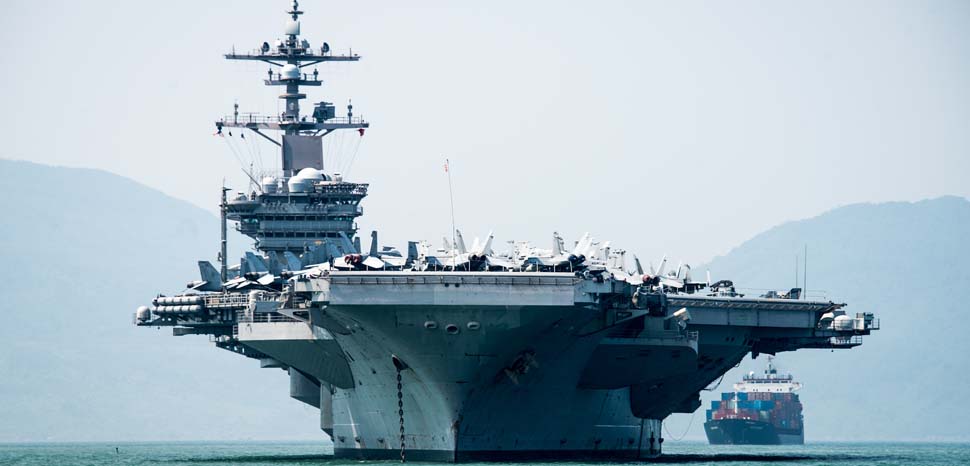The world’s attention has been captured by the political drama emanating out of Pyongyang and Washington. The cat-and-mouse posturing prior to a potential June summit that may lead to an incremental denuclearization over what is likely going to be a generation masks the critical and potential irreversible geopolitical machinations occurring in the South China Sea (SCS) as China expands its military, economic, and diplomatic influence in the region.
In the wake of China’s rejection of the Permanent Court of Arbitration’s (PCA) July 12th, 2016 decision that China holds no legal claim over any of the waters and formations in the South China Sea, we have seen Beijing incrementally re-enforce its claims through the installation of cruise missiles and anti-aircraft batteries on artificial islands. At the same time, we have seen China fracture ASEAN unity on territorial disputes in the SCS by first courting the Cambodians in July 2012, and then pulling Manila into Beijing’s political orbit following the election of President Duterte in July 2016. The result has been no consensus in ASEAN, no common approach to managing the South China Sea, and an inability to push back against Chinese expansionism.
China as a Disruptor or a Stabilizer?
China’s foreign policy activities in the South China Sea have elicited much criticism by the regional and the international community. Notwithstanding, analysts within China concerning SCS diplomacy are mostly positive in their evaluation of the gains achieved through diplomacy and land reclamation projects/artificial islands building.
According to an unnamed scholar interviewed in Beijing in March 2018, “China’s approach has stabilized the region by fortifying its position in the South China Sea, creating the “good” conditions to agree on a code of conduct (COC) in the SCS.” In the same month, another scholar specializing in maritime affairs in Shanghai added “China has created stability by encouraging Manila to put aside the PCA’s decision in lieu for economic and development cooperation. Look at the Philippines, they are receiving Chinese economic aid, they have access to fishing resources in Chinese territories, and Sino-Philippines relations are the best they have been in years.” Only a minority of scholars viewed Beijing’s South China Sea policies as not constructive or as a misstep eliciting its own worst nightmare: the beginning of a containment strategy ushered in by overly assertive policies in the SCS.
The View from Hanoi
While these views may represent Chinese understandings of their diplomatic contributions to stabilizing relations in the SCS, Vietnamese-SCS watchers have deepening concerns over Chinese activities in what Vietnam understands as its own backyard.
Mr. Viet Hoang, a legal expert in Ho Chi Minh City who has conducted many studies on the South China Sea, stresses that the lull in open friction hides the reality that Sino-Vietnamese relations in the SCS is still very tense as Hanoi watches helplessly as Beijing militarizes man-made structures in the Paracel and Spratly Islands, buttressing its military dominance of the region.
His thoughts were echoed by anonymous Vietnamese journalists who stressed that Vietnam has been unable to resist Chinese expansionism due to a lack of resources. As a result, Beijing has firmly consolidated its position in the South China Sea at Hanoi’s expense.
Unnamed scholars at Vietnam’s Diplomatic Academy are concerned that China will use its facilities and weapons to one day block Vietnamese and others’ access to the sea, changing the status quo over the offshore features, and eventually preventing Hanoi from exercising rights as stipulated by UNCLOS. For Vietnam, the South China Sea is not just a territorial dispute, but also a set of maritime disputes which involve different interpretations and applications of UNCLOS.
Legal and Coercive Tactics
Concerns seem to be grounded in a track record of destabilizing behavior according to Hoang. China has deployed bombers to Woody Island (Paracels), a sign that China continues to escalate tension in this region. Moreover, despite the Philippines’ award which ruled that the claim of “historic rights” within the nine-dotted line was without legal basis, China has been still working to make it a reality using legal instruments as well as more coercive tactics to achieve its strategic objectives.
To illustrate, on the legal front China has lobbied scholars to conduct research against the verdict. Most recently, the Chinese International Law Society published a 500-page booklet damning the verdict.
Coercive tactics can be seen as China has threatened and prevented oil and gas companies from operating in the Vanguard Bank area, although under UNCLOS, the oil blocks are entirely within Vietnam’s EEZ. In 2017, China threatened Vietnam to withdraw Repsol from block 136-03 and in March this year, China also pressured Vietnam to ask Repsol to withdraw from block 07-03. Most recently, China has applied pressure once again, asking Rosneft to withdraw from Block 06-01, claiming that these blocks are in Chinese waters, even though they are in the EEZ of Vietnam.
A Role for Outside Powers?
Australia, India, Japan, and the U.S. have all stepped up their activities within the region as they all have a deep interest in maintaining peace and stability in the South China Sea. This has become even more salient in the light of the signing of the Comprehensive Progressive Trans Pacific Partnership (CPTPP).
Vietnam is clear eyed about their increased stakes in the region, and is keen to cooperate with these countries in maintaining a stable environment in the SCS. Amongst these countries, argues Hoang, “the United States as a superpower in the world plays an important role in restraining China. Japan is a powerful economic power in Asia and a “natural ally” of Vietnam to counter China’s aggressive actions; however, Vietnam is still developing its relationship with the United States and Japan, especially its defense relations, to improve its defensive power.”
This view is not shared by unanimously in Vietnam. Anonymous views from the Diplomatic Academy were more realistic about the role of extra-regional powers. They stressed that “Vietnam does not expect extra-regional powers to come to defend its sovereignty and interests.” Rather, they believe that “extra-regional powers have a shared interest in maintaining peace and stability, keeping the sea open, and defending the rule-based order in the South China Sea, which serves as strategic waterway for sea-borne trade for all. Therefore, Vietnam thinks that it is in the interest of other powers and the world to keep an eye on the happenings and maintain presence in the South China Sea, which in turn helps to place a check on China’s assertiveness and military adventure.”
Others were more pessimistic in their assessments, recognizing that extra-regional powers have broad and diverse ties and dependencies with China, for example the need to have Chinese cooperation in denuclearizing North Korea. If the U.S. or Japan presses Beijing on SCS issues, it may be less cooperative in resolving the North Korean problem. Assessments of the Quadrilateral Security Dialogue (U.S., Japan, India, and Australia) as an instrument to resolve South China Sea issues or relying on ASEAN were also dismissed by Vietnamese scholars and experts, recognizing that the former is more lip than teeth and the latter suffers from institutional sclerosis as members are divided and the ‘ASEAN way’ cannot meet the diversity of security demands of its members (and their friends).
The Trajectory of Sino-Vietnamese Relations
Hanoi’s diplomatic choices going forward are limited by Vietnam’s aversion to alliances. In light of these limitations and the asymmetry in capabilities between China and Vietnam, Hanoi is striving to deepen and broaden cooperation with China and extra-regional partners, to protect its interests while attempting to restrain its own behavior and avoid an escalation in the bilateral tensions. The hope is that these relationships will continue to grow in both breadth and depth according to scholars.
A Role for ASEAN in Managing the Territorial Disputes?
Vietnamese scholars see ASEAN as one of the most important platforms for claimants and other Southeast Asian countries to discuss and foster proper management of the disputes. The ultimate goal is preventing the use of force and activities which would upset the status quo such as the occupation of land features, and to regulate behavior of claimants and other users of the sea.
The challenge is that ASEAN members now have a wide range of interests and ASEAN’s unity is challenged both by internal differences and by the influence of outside powers, in particular China. Realities aside, the role of ASEAN is indispensable in this region, especially with regard to the South China Sea issue according to scholars at the Diplomatic Academy, who stressed that “at present, ASEAN and China are still in the process of moving towards a COC for the South China Sea. A COC will help reduce tensions and prevent military conflicts in the region. However, there are also many obstacles and a COC needs a long time to be put in to force. We should also look forward to a more mature, united ASEAN, and at that time many conflicts and tensions could be resolved.”
The longer the North Korean nuclear drama continues, the greater the challenge Vietnam and other ASEAN countries will face when asserting their territorial claims in the South China Sea. Extra-regional countries should ensure that their diplomatic bandwidth includes the SCS, otherwise they could find themselves in a regional hegemonic fait accompli when the world’s most important import/export and energy sea lanes are dominated by one country.
The opinions, beliefs, and viewpoints expressed by the authors are theirs alone and don’t reflect any official position of Geopoliticalmonitor.com.




